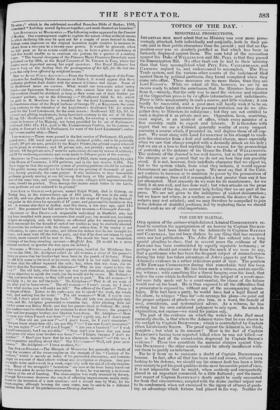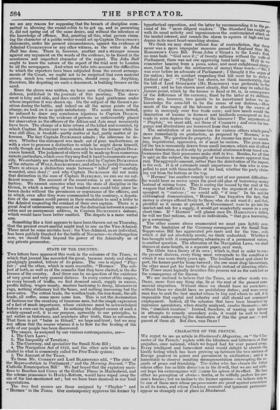THE COURT MARTIAL.
OUR opinion of the antmus which dictated Admiral CODRINGTON'S re- fusal to sanction the appropriation of an honour by Captain DICKIN- SON which had been denied by the Admiralty to Captains BAYNES and CAMPBELL, has not been shaken by any thing that has occurred since our last publication. The John Bull has entered into a long special. pleading to show, that in several cases the evidence of Sir EDWARD has been contradicted by equally reputable testimony; or perhaps we should not wander far from the mark if we were to say, that a gentleman who has been the frequent subject of animadversion during the trial has taken advantage of John's pages to put the Vice- Admiral's evidence in a rather ridiculous point of view. The position of Sir EDWARD CODRINGTON during this remarkable trial has been altogether a singular one. He has been made a witness, and an unwill- ing witness ; with something like a threat hanging over his head, that unless the case which he declined making the subject of a court-mar- tial were fully made out to a court-martial, the blame of the failure would rest on his head. He is thus exposed to all the difficulties that a prosecutor is exposed to, without any of the accompanying advan- tages, If he had been a party, he would have had a legal friend at his elbow, to whisper "thus far"—to arrange his plans—to point out the proper subjects of attack—to give him, in a word, the benefit of cool, considerate, and systematized advice. As a witness, he has nothing but his own untutored judgment to rely upon. So much in eXplanation, not excuse—we stand for justice only. The part of the evidence on which the writer in John Bull most earnestly dwells, is that where the Admiral states that he was shown to the cockpit by Captain DICKINSON; which is contradicted by Captain (then Lieutenant) SMITH. The proof against the Admiral is, we think, complete ; but what is its amount? How is the fact of Captain DATHUToST'S having been reported killed when he was not killed—or how is the fact of the round-robin disproved by Captain SMITH'S evidence ? These two constitute the material charg,es against Cap- tain DICKINSON : the other counts would be utterly insAcient with- out them to justify an indictment. Far be it from us to insinuate a doubt of Captain DICKINSON'S honour. In fact, after all that has been said and sworn, without even looking to his defence, we should say his utmost fault has been a little over anxietyto put his good qualities in the most favourable point of view. It is not impossible that he might, when suddenly and unexpectedly placed in an important command, be a little fluttered ; and the incor- rect report of Captain BATHURST'S death might be easily accounted for from that circumstance, coupled with the desire (neither unjust nor to be condemned, when not exercised to the injury of others) of push- ing an advantage which fortune had placed in his way. Neither do we see any reason for supposing that the breath of discipline corn. mitted in allowing the round-robin to be got up, and in presenting it, did not spring out of the same desire, and without the intention or the knowledge of offence. But, granting all this, what person claim- ing the character of a public writer would set up Captain DICKINSON'S statements, under his present circumstances, against the evidence of Admiral CODRINGTON or any other witness, as the writer in John Bull has done. There is, however, another and a stronger reason against any argument on the words of the evidence, to be found in the scantiness and imperfect character of the report. The John Bull ought to know the nature of the report of the trial sent to London to all the newspapers. And when we take into account the difficulties to which the reporters have been subjected from the recent arrange- ments of the Court, we ought not to be surprised that even material errors, much less verbal inaccuracies, should creep in. Anything, therefore, like disputing on such a document, is building houses on the sand.
Since the above was written, we have seen Captain Dime irrsoN's defence, published in the journals of this morning. The docu- ment is long and able, and does credit to the legal gentleman under whose inspection it was drawn up. On the subject of the Genoa's po- sition during the battle, and indeed on all the • minor points of the charge, we look on it as quite satisfactory. We could never, indeed, be induced to draw any conclusion injurious to Captain DICKIN- sores character from the evidence of persons so unfavourably placed for observation as the officers of the Albion and Asia must necessarily have been. The charge of a false return of the killed and wounded, by which Captain BATHURST was included ammig the former while he was still alive, is twofold—partly matter of fact, partly matter of in- ference. The fact Captain DICKINSON admits : the inference he de- nies. Whether the statement was made out of pure inadvertence, or with a view to procure a distinction to which he might deem himself, really though not formally entitled, can only be known to Captain Di c INSON himself. The judgment of others will be made up from numerous minute particulars, which even they may find it hard to enumerate or spe- cify. We certainly see nothing in the cases cited by Captain DICKINSON of the returns of Woes., An ERCROMBY, and others, to justify his return. There is always a distinction made between" killed" and "mortally wounded, since dead ;" and why Captain DICKINSON did not make that distinction in the case of Captain BATHURST, we can see no suf- Ecient reason. The account of the round-robin is yet more unsatis- factory, We cannot conceive what was the state of discipline in the Genoa, in which a meeting of two hundred men could take place be- tween decks without the permission or cognizance of the officers, and in which, even after they were commanded to the contrary, a deputa- tion of the• seamen could persist in their resolution to send a letter to the Admiral respecting the conduct of their own captain. There is a great deal of unnecessary argument on the distinction betweerra rounth robin and an anonymous address, in Captain DICKINSON'S defence, which would have been better omitted. The dispute is a mere verbal one.
Something like a hint appears to have been thrown out on Thursday, that the present court-martial might lead to one on the Vice-Admiral. There must be some mistake here : the Vice-Admiral, as an individual, has been publicly thanked for the battle of Navarino—to challenge him now, we should think beyond the power of the Admiralty or of any private prosecutor..



















 Previous page
Previous page